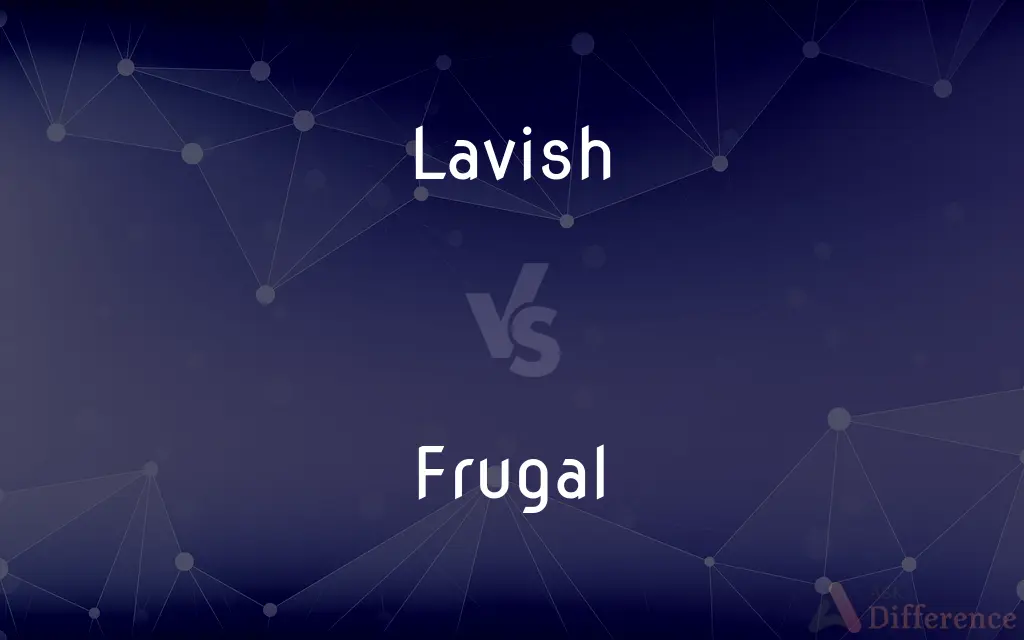Lavish vs. Frugal — What's the Difference?
Edited by Tayyaba Rehman — By Fiza Rafique — Updated on October 12, 2023
"Lavish" implies extravagance and luxury, often to excess. "Frugal" means being economical and sparing in expenditure.

Difference Between Lavish and Frugal
Table of Contents
ADVERTISEMENT
Key Differences
"Lavish" and "Frugal" are words that represent opposite ends of the spending spectrum. "Lavish" paints a picture of opulence, extravagance, and excessiveness. When one is described as lavish, it typically means they're not holding back in their spending or way of living. They might opt for the most expensive items or experiences without concern for cost. On the other hand, "Frugal" embodies prudence, thriftiness, and careful expenditure.
Being frugal doesn't necessarily mean being stingy or cheap; rather, it points to a conscious decision to live within or below one's means, making thoughtful choices about spending. In contrast, "Lavish" choices tend to prioritize luxury and indulgence, often without much thought to necessity or long-term implications.
While "Lavish" can be perceived as impressive or ostentatious, it can also sometimes be seen as wasteful. In some contexts, it might even carry a negative connotation, implying thoughtlessness or recklessness. Conversely, while "Frugal" might be seen as wise or prudent, it can sometimes be perceived as overly cautious or lacking in generosity.
It's worth noting that neither of these terms carries a universally positive or negative connotation. They simply represent different approaches to spending and consumption. A lavish celebration might be entirely appropriate for a significant milestone, just as frugality might be crucial during financial hardships.
Comparison Chart
Connotation
Extravagance and luxury
Economy and prudence
ADVERTISEMENT
Spending Approach
Often without concern for cost
Careful and selective in expenditure
Perception
Can be seen as impressive or wasteful
Might be seen as wise or overly cautious
Lifestyle Implication
Opulent lifestyle, often with the best items or experiences
Modest lifestyle, prioritizing savings
Economic Behavior
Might not consider long-term financial implications
Thinks about long-term financial security
Compare with Definitions
Lavish
Sumptuously rich and luxurious.
The hotel had a lavish interior.
Frugal
Simple and plain, costing little.
He drove a frugal car to save on gas.
Lavish
Bestowed or expended in generous amounts.
He received lavish praise for his work.
Frugal
Avoiding waste.
Her frugal habits meant she rarely threw anything away.
Lavish
Excessive; overly abundant.
She wore lavish amounts of makeup.
Frugal
Reflecting prudence in spending.
She made a frugal choice by buying off-brand groceries.
Lavish
Using resources to the greatest possible advantage.
The party had a lavish spread of food.
Frugal
Sparing or economical with regard to money or food.
She led a frugal lifestyle.
Lavish
Characterized by or produced with extravagance and profusion
A lavish buffet.
Frugal
Practicing careful economy.
He was frugal with his earnings, saving for the future.
Lavish
Immoderate in giving or bestowing; unstinting
The critics were lavish with their praise.
Frugal
Sparing or economical as regards money or food
I'm a bit too frugal to splash out on designer clothes
Lavish
To give or bestow in abundance; shower
Lavished attention on his customers.
Frugal
Practicing or marked by economy, as in the expenditure of money or the use of material resources.
Lavish
To give something in abundance to
"The aides began lavishing him with kindnesses" (Kay Marie Porterfield).
Frugal
Simple or costing little; meager or inexpensive
A frugal lunch.
Lavish
Expending or bestowing profusely; profuse; prodigal.
Lavish of money;
Lavish of praise
Frugal
Avoiding unnecessary expenditure either of money or of anything else which is to be used or consumed; avoiding waste.
Frugal advice
Lavish
Superabundant; excessive.
Lavish spirits
Lavish meal
Frugal
Economical in the use or appropriation of resources; not wasteful or lavish; wise in the expenditure or application of force, materials, time, etc.; characterized by frugality; sparing; economical; saving; as, a frugal housekeeper; frugal of time.
I oft admireHow Nature, wise and frugal, could commitSuch disproportions.
Lavish
(obsolete) Unrestrained, impetuous.
Frugal
Obtained by, or appropriate to, economy; as, a frugal fortune.
Lavish
(transitive) To give out extremely generously; to squander.
They lavished money on the dinner.
Frugal
Avoiding waste;
An economical meal
An economical shopper
A frugal farmer
A frugal lunch
A sparing father and a spending son
Sparing in their use of heat and light
Stinting in bestowing gifts
Thrifty because they remember the great Depression
`scotch' is used only informally
Lavish
(transitive) To give out to (somebody) extremely generously.
They lavished him with praise.
Lavish
(obsolete) Excessive abundance or expenditure, profusion, prodigality.
Lavish
Expending or bestowing profusely; profuse; prodigal; as, lavish of money; lavish of praise.
Lavish
Superabundant; excessive; as, lavish spirits.
Let her have needful, but not lavish, means.
Lavish
To expend or bestow with profusion; to use with prodigality; to squander; as, to lavish money or praise.
Lavish
Expend profusely; also used with abstract nouns;
He was showered with praise
Lavish
Very generous;
Distributed gifts with a lavish hand
The critics were lavish in their praise
A munificent gift
His father gave him a half-dollar and his mother a quarter and he thought them munificent
Prodigal praise
Unsparing generosity
His unstinted devotion
Called for unstinting aid to Britain
Lavish
Characterized by extravagance and profusion;
A lavish buffet
A lucullan feast
Lavish
Extravagant, especially in cost.
They went on a lavish vacation to Europe.
Common Curiosities
Is being "Frugal" the same as being cheap?
No, frugality is about being economical and avoiding waste, not just spending less.
Can a party be both "Lavish" and "Frugal"?
It's unlikely, as the terms are opposite in nature.
Is "Lavish" always about spending money?
No, it can also describe anything done to excess or extravagance.
Is a "Lavish" lifestyle sustainable long-term?
It depends on one's resources and financial management.
Can "Lavish" be used positively?
Yes, like praising someone lavishly.
Does "Frugal" mean lacking in quality?
No, it's about cost-consciousness, not necessarily quality.
Can a gift be "Lavish"?
Yes, if it's expensive or extravagant.
Why might someone choose to be "Frugal"?
To save money, avoid debt, or prioritize specific financial goals.
Is "Lavish" always about material items?
No, it can also describe actions or behaviors done to excess.
Is "Frugal" living the same as minimalist living?
Not necessarily. Frugality focuses on cost, while minimalism focuses on simplicity.
Can you be "Frugal" and still enjoy life?
Absolutely. Many find happiness in simplicity and thoughtful spending.
Can "Lavish" describe an emotion?
Yes, one can "lavishly" express love or praise.
Can "Lavish" be an adjective and a verb?
Yes, as in "lavish decorations" and "to lavish praise."
Does "Frugal" mean always choosing the cheapest option?
No, it's about value and avoiding unnecessary expenses.
Can "Frugal" apply only to money?
Primarily, but it can also relate to other resources, like time or materials.
Share Your Discovery

Previous Comparison
Development vs. Improvement
Next Comparison
Diction vs. ToneAuthor Spotlight
Written by
Fiza RafiqueFiza Rafique is a skilled content writer at AskDifference.com, where she meticulously refines and enhances written pieces. Drawing from her vast editorial expertise, Fiza ensures clarity, accuracy, and precision in every article. Passionate about language, she continually seeks to elevate the quality of content for readers worldwide.
Edited by
Tayyaba RehmanTayyaba Rehman is a distinguished writer, currently serving as a primary contributor to askdifference.com. As a researcher in semantics and etymology, Tayyaba's passion for the complexity of languages and their distinctions has found a perfect home on the platform. Tayyaba delves into the intricacies of language, distinguishing between commonly confused words and phrases, thereby providing clarity for readers worldwide.
















































